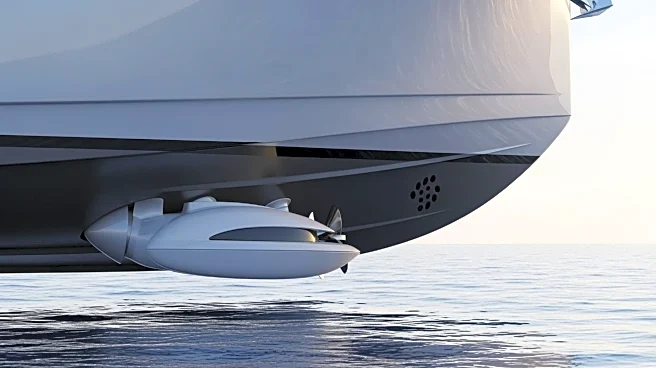What's Happening?
The evolution of pilot boat technology has seen significant advancements, particularly with the introduction of the Volvo Penta IPS pod system. This system is noted for its ability to reduce fuel consumption
by 30%, marking a substantial improvement in efficiency. The development is part of a broader trend in pilot boat technology, which is heavily influenced by local water conditions and the specific needs of pilot operations. Despite some hesitancy from pilot associations due to concerns about ice, debris, or service support, those who have adopted the IPS system have reported clear benefits. The system is complemented by ride control technologies, such as interceptors and gyro stabilizers, which enhance comfort and efficiency by allowing adjustments to the boat's attitude relative to speed.
Why It's Important?
The introduction of the IPS pod system represents a significant shift in the maritime industry, particularly for pilot boats that are crucial for safe navigation in harbors and channels. The 30% reduction in fuel consumption not only offers cost savings but also contributes to environmental sustainability by lowering emissions. This technological advancement could set a new standard for pilot boat operations, encouraging more widespread adoption of energy-efficient systems. The potential for reduced operational costs and environmental impact makes this development particularly relevant for ports and pilot associations looking to modernize their fleets while adhering to stricter environmental regulations.
What's Next?
As the maritime industry continues to evolve, the adoption of new technologies like the IPS pod system is expected to increase. Pilot associations may gradually overcome their initial hesitancy as the benefits become more apparent and as service support for these systems improves. Additionally, ongoing advancements in ride control and propulsion technologies could further enhance the performance and efficiency of pilot boats. The industry may also see increased interest in hybrid-electric propulsion systems, although their applicability to pilot operations remains under evaluation. The continuous feedback loop between pilot associations and shipbuilders will likely drive further innovations tailored to specific local conditions.
Beyond the Headlines
The shift towards more efficient pilot boat technologies highlights broader trends in the maritime industry, including a focus on sustainability and cost-effectiveness. This evolution reflects a growing recognition of the need to balance operational demands with environmental responsibilities. The development of technologies like the IPS pod system also underscores the importance of collaboration between shipbuilders and pilot associations to address unique local challenges. As these technologies become more mainstream, they could influence regulatory standards and reshape the competitive landscape for shipbuilders and maritime service providers.










